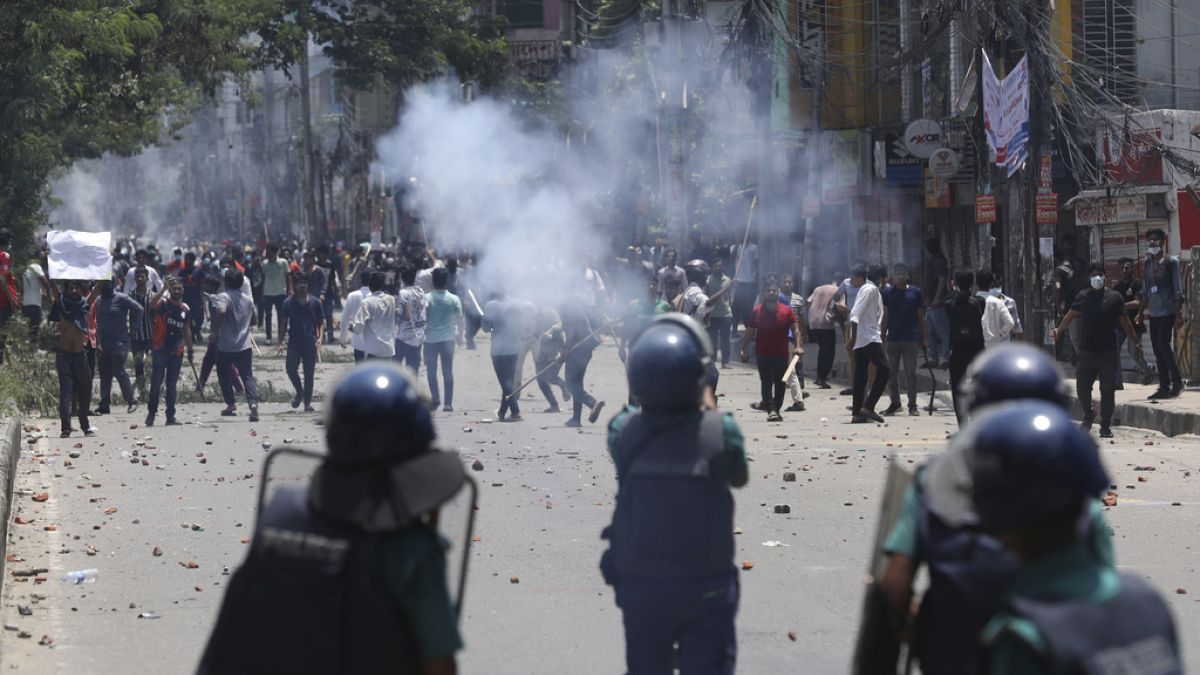The recent deadly clashes over the allocation of government jobs in Bangladesh have led to a sharp escalation of protests in the capital. The internet and mobile services were cut off amidst the chaos, which has presented a significant challenge to Prime Minister Sheikh Hasina since her re-election in January. The protesters, mainly young graduates, are demanding an end to the quota system that reserves government jobs for relatives of veterans from the 1971 war of independence against Pakistan. The system is seen as discriminatory and benefits the supporters of Prime Minister Hasina.
Bangladesh’s governance and economy have come under scrutiny due to the ongoing protests, with frustrations arising from a lack of job opportunities for the country’s young graduates. The government has deployed police and paramilitary forces to quell the demonstrations, leading to a lockdown of campuses and banning of all gatherings in the capital. The situation escalated when border guard officials fired at a crowd of protesters outside the state-run Bangladesh Television headquarters. The violence has claimed several lives and resulted in disruptions to internet services and mobile data.
The protesters have expressed their determination to continue their calls for a shutdown until their demands are met. Major universities have decided to close their doors until tensions ease, and student demonstrators have urged mosques across the country to hold funeral prayers for those who have lost their lives during the clashes. The demands for a merit-based system for government job allocations have led to a stand-off between the protesters and Prime Minister Hasina, who has defended the quota system as a mark of respect for the 1971 war veterans.
The protests in Bangladesh have drawn international attention, with concerns raised about the suppression of freedoms and human rights violations by the government. The crackdown on dissent has resulted in several internet shutdowns in the past, and the recent disruptions have left the country isolated from the rest of the world. The international community has called for a peaceful resolution to the crisis and urged the government to address the grievances of the protesters. The situation has also highlighted the growing dissatisfaction with rising inflation and job scarcity in the country.
The opposition Bangladesh Nationalist Party has thrown its support behind the protesting students and has pledged to organize its demonstrations. The BNP supporters have joined the students in their demonstrations, leading to further clashes with the authorities. The ongoing political chaos between the ruling Awami League and the opposition parties has exacerbated the tensions, with accusations of inciting violence being thrown from both sides. The government’s decision to reinstate the job quotas following a court ruling has further fueled the demonstrations and protests, creating a volatile situation in the country.
In conclusion, the situation in Bangladesh remains tense as the protests over government job allocations continue to escalate. The crackdown on dissent, internet shutdowns, and violent clashes have put the spotlight on the governance and economy of the country. The demands of the protesters for a merit-based system for job allocations reflect the frustrations of the young graduates facing a lack of opportunities. The international community is closely monitoring the developments in Bangladesh and calling for a peaceful resolution to the crisis. The government and opposition parties must engage in dialogue to address the grievances of the protesters and find a sustainable solution to the ongoing crisis.































